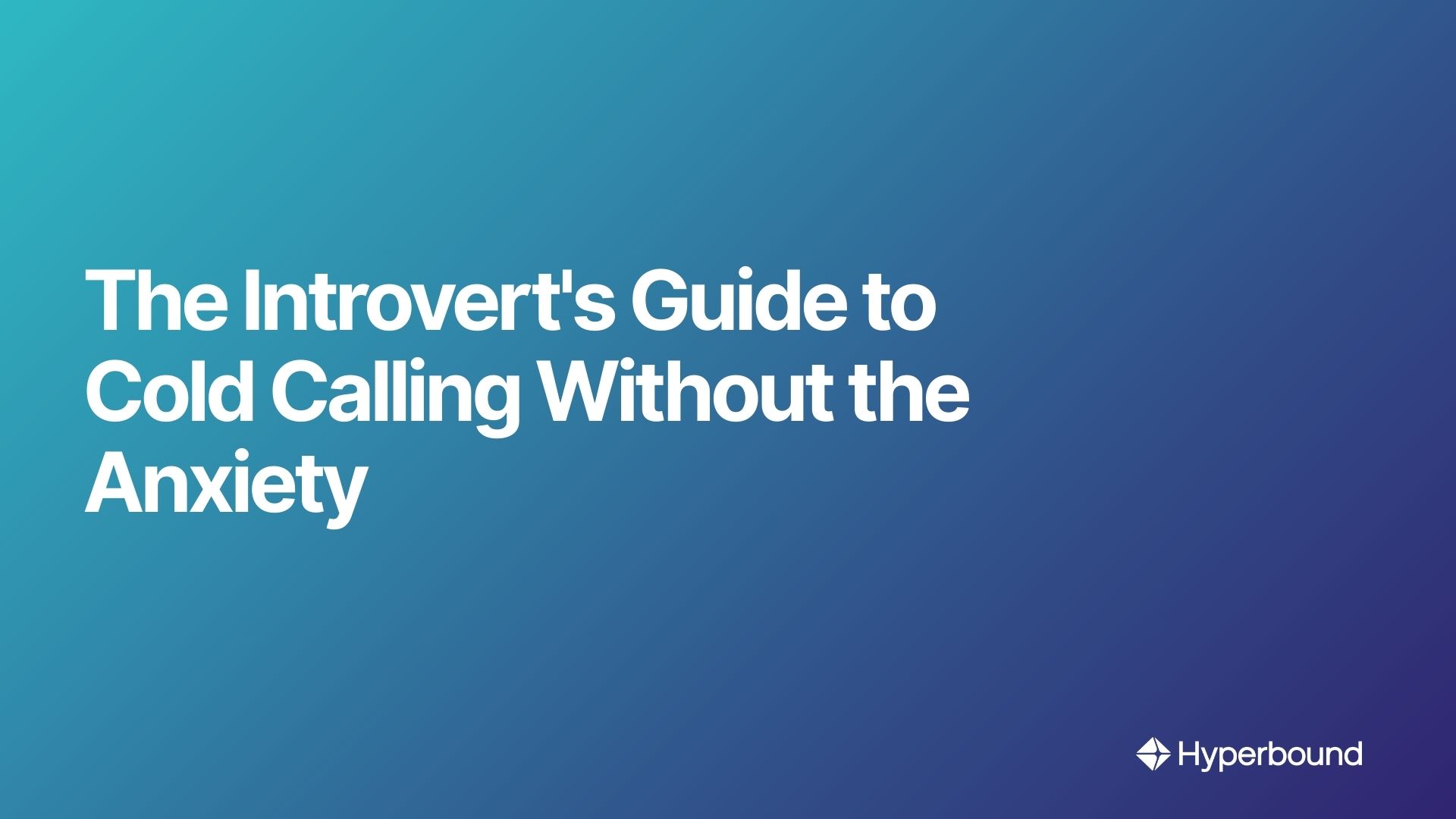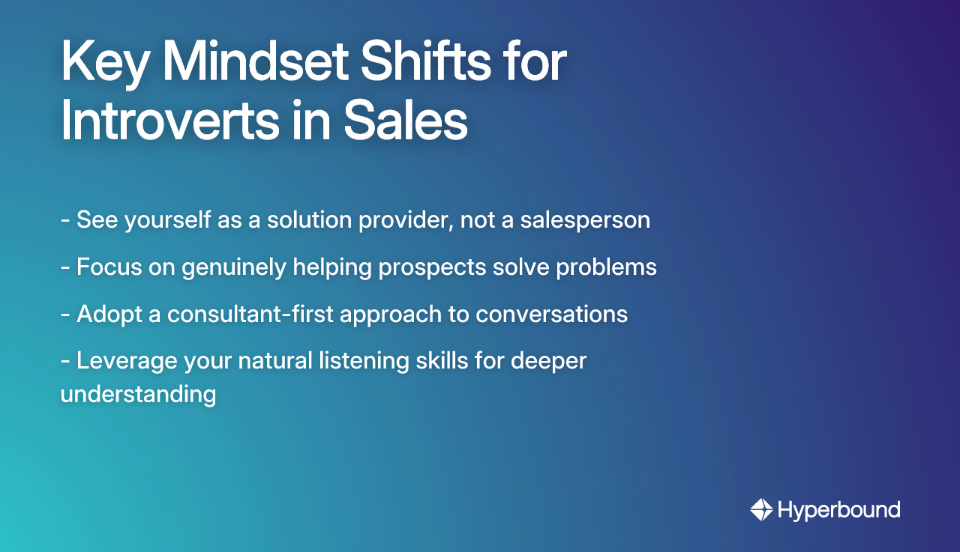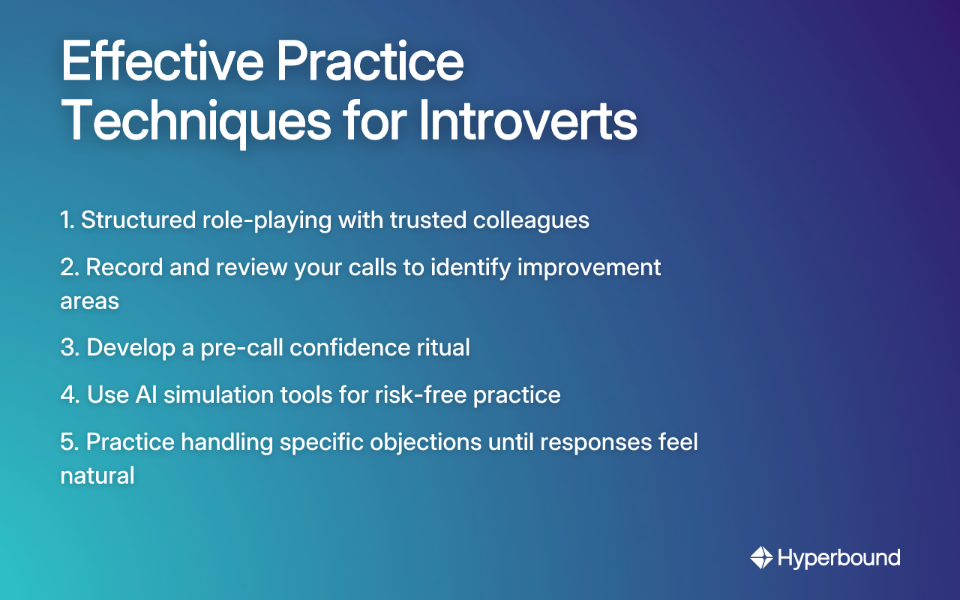
You've set up your workspace, prepared your notes, and now you're staring at your phone. Your heart races, your palms sweat, and that familiar knot tightens in your stomach. "I hate cold calling... gives me the chills," you think to yourself. Every worknight, you lay in bed dreading the next day when you'll have to start making calls all over again.
If this sounds familiar, you're not alone. For introverts in sales, cold calling can feel like torture—especially when management is applying pressure, saying, "we need to start cold calling more in order to prospect for new business."
The good news? Being an introvert doesn't mean you can't excel at cold calling. In fact, your thoughtful nature and listening skills give you distinct advantages in B2B sales—if you know how to leverage them.
The Mindset Shift: From Selling to Helping

The first step to reducing cold calling anxiety is transforming how you think about the process. Stop viewing yourself as an unwelcome salesperson and start seeing yourself as a solution provider.
When you call prospects, you're not imposing on their time—you're offering valuable insights that could solve significant problems in their business. This mindset shift was transformative for many introverted sales professionals:
"When I stopped thinking about making a sale and started focusing on how I could genuinely help the prospect, everything changed," says Jamie, an introverted SaaS sales representative. "My anxiety decreased because I knew I was providing value, not just asking for something."
This consultant-first approach aligns perfectly with introverted personalities. Instead of pushing products, you're having a conversation about their needs—something introverts often excel at.
Preparation: Your Secret Weapon
Introverts thrive on preparation, making it your most powerful tool against cold calling anxiety. Here's how to leverage this natural strength:
1. Research Your Prospects Thoroughly
Before making any cold call, gather substantial information about your prospect:
- Company size and structure
- Recent news or developments
- Pain points common in their industry
- How your value proposition specifically addresses their challenges
This preparation serves two purposes: it reduces uncertainty (a major anxiety trigger) and gives you relevant talking points to establish credibility quickly.
2. Group Similar Prospects
One strategy that works particularly well for introverts is "bucketing" similar prospects together. Call all the Marketing Directors, then all the CTOs, etc. This approach minimizes mental context switching, allowing you to refine your approach with each successive call.
3. Create a Flexible Script
While you shouldn't read verbatim, having a well-structured script acts as a safety net when anxiety strikes. Your script should include:
- A clear introduction that states your name and company
- Your reason for calling (based on your research)
- Your value proposition framed as a solution to their specific challenge
- Open-ended questions to uncover needs
- Responses to common objections
- A clear next step request
"Get comfortable with the script before calling," recommends a sales professional on Reddit. "Try calling a friend first to warm up your voice and get into a conversational rhythm."

Crafting Language That Feels Natural
Introverts often struggle when cold calling feels forced or inauthentic. The key is developing language patterns that feel natural to you:
Tell Stories Instead of Listing Features
Rather than rattling off product specifications, share a brief story about how your solution helped a similar client:
"I recently worked with a company facing the exact same challenge with lead generation. After implementing our solution, they saw a 30% increase in qualified appointments within just two months. I'd love to explore if we could achieve similar results for you."
Storytelling feels more conversational and authentic than traditional pitching, making it perfect for introverts.
Reframe Your Opening to Sound Helpful
Instead of:"Hi, I'm calling to tell you about our product..."
Try:"Hi [Name], I'm [Your Name] from [Company]. I noticed your team has been expanding its digital marketing efforts, and many similar companies are struggling with converting those efforts into face-to-face meetings. I've helped several businesses in your industry overcome this challenge, and I thought a quick conversation might be valuable. Is this something you're currently focusing on?"
Handling Objections Without Confrontation
For introverts, objection handling can be particularly stressful because it feels confrontational. The secret is to view objections not as rejection but as requests for more information.
The Acknowledge, Respond, and Redirect Method
When faced with an objection:
- Acknowledge their concern with empathy: "I completely understand that concern..."
- Respond with a thoughtful answer: "Many of our current clients initially felt the same way..."
- Redirect to continue the conversation: "Would it be helpful if I shared how they overcame that same concern?"
Specific Responses to Common Objections:
"I'm not interested.""I appreciate your directness. Many of our best clients weren't interested at first either. They found that a brief 15-minute deep dive into how we approach [specific problem] was eye-opening. Would you be open to a quick conversation to see if our approach might be valuable to you?"
"Send me some information.""I'd be happy to. To ensure I send the most relevant materials for your situation, could you tell me which aspect of [prospect's likely challenge] is most important to you right now?"
This turns a brush-off into an opportunity to continue the conversation and gather information for a warm call follow-up.
Building Confidence Through Practice

To overcome cold calling anxiety, systematic practice is essential. Here are techniques specifically designed for introverts:
Role-Playing That Doesn't Feel Awkward
Find a trusted colleague for role-playing exercises. Unlike extroverts who might jump right in, introverts benefit from structured practice:
- Start with scripted scenarios where you know exactly what to say
- Progress to semi-structured calls with prepared objections
- Finally, practice completely unscripted scenarios
"I found doing a bunch of roleplaying helped a ton," shares an introverted sales rep. "It was uncomfortable at first, but it dramatically reduced my anxiety when making actual calls."
While practicing with colleagues is valuable, coordinating schedules can be difficult. This is where AI simulation tools can be a game-changer for introverts. Platforms like Hyperbound's AI Sales Roleplays provide a safe, on-demand environment to practice against realistic AI buyer personas, allowing you to build confidence at your own pace without judgment or the awkwardness of traditional role-play.
Record and Review
If permitted in your organization, record your calls (both practice and real ones). This allows you to manually analyze your performance without the pressure of being on a live call. Focus on:
- Your tone and pace (aim for calm and conversational)
- Filler words to eliminate ("um," "like," "you know")
- Places where you sound most and least confident
To accelerate your learning, AI-powered tools like Hyperbound's AI Real Call Scoring can automate this review process, giving you instant, unbiased feedback on your performance.
Pre-Call Confidence Ritual
Develop a personal ritual to prepare yourself mentally before cold calling sessions:
- Deep breathing (2 minutes): Inhale for 4 seconds, hold for 2, exhale for 6. This activates your parasympathetic nervous system, reducing anxiety.
- Visualization (2 minutes): Picture the call going well. Imagine the prospect engaged and interested.
- Power pose (1 minute): Stand tall with shoulders back. Your physical posture affects your mental state and how your voice sounds.
"I have such severe anxiety before starting calls that I need to take a break and meditate," admits one sales professional. Finding what works for you is key—whether it's meditation, breathing exercises, or a quick walk.
Measuring Success Differently
For introverts, reframing how you measure success can dramatically reduce anxiety:
- Success isn't just closing a sale. It's learning something new about your market, improving your skills, or having a genuine conversation.
- Rejection isn't personal. It's simply information that helps you refine your approach for client engagement.
- Every call is progress. Rather than dreading each dial, view it as a step toward mastery and competence.
As one successful introverted salesperson puts it: "You just gotta force yourself to do it over and over until it's no longer painful. The key is changing how you define a 'win'."
Leveraging Email Outreach to Warm Up Cold Calls
For introverts, cold calling can feel less intimidating when it's not completely "cold." Use email outreach to create a foundation:
- Send a personalized, value-focused email first
- Reference this email when you call: "I'm following up on the email I sent about helping with your prospecting challenges..."
- Use insights from any email interaction to customize your call
This approach transforms intimidating cold calls into more comfortable warm calls.
Conclusion: Embrace Your Introverted Strengths
Being an introvert in sales isn't a disadvantage—it's a different set of strengths. Your natural tendencies toward preparation, thoughtful communication, and deep listening are incredibly valuable in consultative B2B selling.
By shifting your mindset from selling to helping, preparing thoroughly, crafting natural-feeling scripts, practicing systematically, and reframing success, you can transform cold calling from a dreaded task into an effective tool for lead generation and appointment setting.
Remember that even the most successful introverted salespeople still feel nervous sometimes. The difference is that they've developed strategies to work with their personality rather than against it.
As you implement these techniques, you'll find yourself dreading the phone less and connecting with prospects more—all while staying true to your introverted nature.
Frequently Asked Questions
What is the single most important mindset shift for an introvert to succeed at cold calling?
The most crucial mindset shift is to see yourself as a solution provider who is helping, not a salesperson who is selling. This change in perspective transforms the call from an unwelcome interruption into a valuable conversation. Instead of feeling like you're asking for something, you focus on genuinely understanding a prospect's problems and offering solutions. This consultant-first approach aligns with an introvert's natural tendency to be a thoughtful listener and problem-solver, which significantly reduces call anxiety.
How can an introvert overcome the fear of rejection during cold calls?
Introverts can overcome the fear of rejection by reframing it as a request for more information, not a personal dismissal. When a prospect raises an objection, view it as an opportunity to understand their concerns better. Use the "Acknowledge, Respond, Redirect" method: empathize with their point, provide a thoughtful response, and then redirect the conversation. Redefining a "win" to be about learning something new rather than just booking a meeting also helps detach your self-worth from the call's outcome.
What are the key elements of a good cold call script for an introvert?
A good script for an introvert should be a flexible framework that includes a clear introduction, a value proposition based on research, open-ended questions, and pre-planned responses to common objections. The script acts as a safety net, not a rigid document to be read verbatim. It should contain your reason for calling, a value statement tailored to the prospect, questions to uncover needs, and a clear call-to-action. This preparation builds confidence and reduces the anxiety of thinking on the spot.
How can introverts practice cold calling effectively?
Introverts can practice effectively through structured role-playing with trusted colleagues or by using AI simulation tools for a pressure-free environment. Structured practice is key; start with fully scripted scenarios and gradually move to unscripted calls. For on-demand, private practice, AI sales roleplay platforms provide a safe space to hone your skills against realistic buyer personas without the potential awkwardness of role-playing with a manager. Recording and reviewing your own calls is another powerful way to identify areas for improvement.
What communication techniques work well for introverts on cold calls?
Introverts often excel by using storytelling and asking insightful, open-ended questions rather than delivering a hard pitch. Instead of listing product features, share a brief, relevant story about how you helped a similar client solve a specific problem. This feels more authentic and conversational. Frame your opening line as an offer to help based on your research, not a demand for their time, which leverages your natural ability to be thoughtful and consultative.
How can I make a cold call feel less "cold"?
You can warm up a cold call by sending a personalized, value-driven email to the prospect before you dial. This strategy creates a foundation for your conversation. When you call, you can reference the email you sent (e.g., "I'm calling to follow up on the email I sent regarding..."). This immediately provides context, makes the call feel less intrusive, and turns a "cold" interaction into a more comfortable "warm" one.

Book a demo with Hyperbound
.png)













